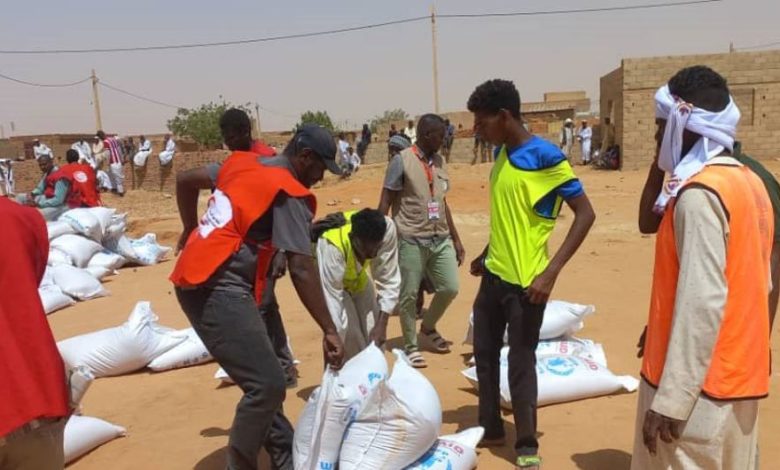Humanitarian Aid for War-Affected Individuals… Putting It All into Perspective

Report by Nawal Shanan
(A.N.), a lady citizen from Khartoum state was forced to leave her home and her family due to the ongoing war. They left everything behind, even the clothes on their backs, fleeing the inferno of the flames. They found refuge in an unidentified shelter, and she told Sudan Event, ‘We hear about aid arriving from abroad, but we haven’t received anything so far, except for aid from some neighbouring families near the shelter. Where do these aids go, and are there any obstacles to delivering them?’
There are no obstacles hindering the flow of humanitarian aid from abroad. However, the international community deals with incredible bureaucracy and their actions don’t match the challenges facing the country, nor do they respond swiftly to the urgent situation. What has arrived so far needs to be revised to meet the needs of those affected in Sudan. This is what Dr. Mohammed Youssef, the head of the Media Committee of the Emergency Committee, informed Sudan Event. He said Arab countries, including Qatar, Kuwait, Saudi Arabia, the United Arab Emirates, Bahrain, Libya, and Egypt, have provided the most substantial assistance. International organisations like the World Food Programme, the World Health Organization, the International Organization for Migration, the International Committee of the Red Cross, Doctors Without Borders, and various Red Crescent societies have also contributed.
The volume of aid, grants, and donations received so far varies, with the highest proportions coming from Arab and neighbouring countries (Qatar, Kuwait, Saudi Arabia, the United Arab Emirates, Bahrain, Libya, and Egypt). However, as I mentioned earlier, the response must be commensurate with the actual need. The international community has provided approximately 27,000 tons of aid through various organisations. The World Food Programme, for instance, delivered aid, and more is yet to come. From Arab countries, 12,000 tons of aid have arrived.
It’s worth noting that the Geneva Conference, which was dedicated to supporting Sudanese affected by the crisis, pledged one and a half billion dollars. The Media Committee’s chairman responded that they are committed to this pledge. Still, the funds have been directed to the countries hosting Sudanese refugees, not to the affected population inside Sudan, and there has yet to be a response thus far.
There are rumours that donor countries prefer to distribute their aid themselves due to a lack of trust in the government. Regarding this point, the Media Committee chairman denied the lack of trust and stated that some countries prefer distributing aid through their agencies and organisations. This is done in accordance with the laws of humanitarian volunteer work. For example, Saudi Arabia’s aid is delivered through the King Salman Center for Relief and Humanitarian Aid. The centre has Sudanese partners, such as Ashraq and Igtinam, through which the aid is distributed. This is done with the knowledge of the government, humanitarian aid agencies, and specialised committees. All procedures are clear and transparent. Distribution is carried out using a pre-prepared map specifying the real needs and the affected states.
Regarding the capacity for storing various humanitarian aid in the Red Sea area, the head of the Media Committee stated that there is no storage of humanitarian assistance, whether food or medical, in Port Sudan. Storage is prohibited. The Supreme Emergency Committee and the Crisis Management Committee, headed by the Prime Minister-designate, include a technical committee headed by the Minister of Culture and Information, Graham Abdul Qadir. The Humanitarian Emergency Technical Committee is among its subcommittees, chaired by the Undersecretary of the Ministry of Social Development, Jamal Al-Nile. The decision is crystal clear: no food or medical supplies arriving from abroad are to be stored. Upon receiving information about incoming aid, whether by ship or plane, trucks are immediately prepared for direct transportation to all affected states 18. Therefore, there are no warehouses in Port Sudan.
Regarding complaints from some affected individuals about aid not reaching them, it was explained that the Supreme Committee, based in Port Sudan, sends humanitarian aid to the states. These states, in turn, establish committees under the governors’ supervision for direct distribution. The distribution is the responsibility of the state committees. Thus, any complaints should be directed to the governors and the local committees in the field, as they are responsible for distribution and have information and statistics about the extent of the damage and the number of affected people.
Concerning the distribution of medicines, medical supplies, and equipment, it was stated that this is done through medical supply centres spread across the states. Due to security issues, the problem lies in delivering aid to some states, especially Darfur. Arrangements have been made with the regional government to provide armed escorts (known as ‘convoy’) for the safe transportation of aid to El Fasher, from where it is distributed to the other states in the region.



